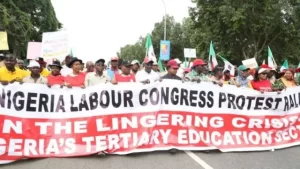Table of Contents
Labour Union in Nigeria has called on President Bola Tinubu to demonstrate his commitment to Nigerian workers by approving their demand for a N250,000 minimum wage.


This request comes in response to the current inflationary trends affecting the country’s economy.

Join our Telegram Channel for Updates
Prince Adewale Adeyanju, a member of the Organised Labour negotiating team and President-General of the Maritime Workers Union of Nigeria (MWUN), highlighted the challenges faced during wage negotiations. He accused state governors of hindering progress, stating that many governors argue they cannot even afford the current N30,000 minimum wage.
Negotiations have seen various proposed figures, starting from N30,000, moving up to N48,000, N60,000, and eventually reaching N62,000 from the government and private sector sides. In contrast, Organised Labour has consistently pushed for N250,000.
Adeyanju emphasized the dire economic situation and the dissatisfaction among workers due to the economic downturn. He stressed that the new minimum wage should significantly improve the lives of workers over the next five years.
He called on President Tinubu to show empathy and fulfill his promise of providing a living wage by approving the N250,000 demand. He argued that the economy could support this figure, despite claims to the contrary from some governors.
The opposition from state governors is a significant hurdle, with many citing financial constraints. However, Adeyanju criticized the governors for prioritizing their security votes over fair wages for workers. He pointed out that some states, like Edo, have already taken steps to increase their minimum wage to N70,000, suggesting that it is feasible for other states to follow suit if they reallocate their budgets.
The organised labour’s appeal to President Tinubu is rooted in the belief that the federal government can afford the proposed N250,000 minimum wage. They urge the president not to yield to the influence of governors who prefer maintaining low wages to sustain their extravagant lifestyles.
The labour leaders argue that a substantial increase in the minimum wage is essential for improving the living standards of Nigerian workers and ensuring economic stability.









